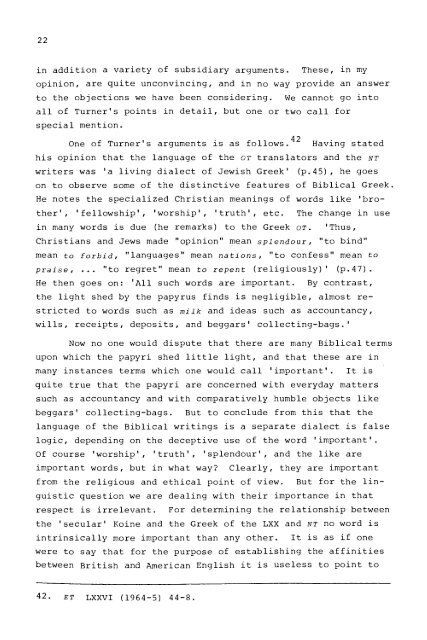A Lexical Study of the Septuagint Version of the Pentateuch
A Lexical Study of the Septuagint Version of the Pentateuch
A Lexical Study of the Septuagint Version of the Pentateuch
You also want an ePaper? Increase the reach of your titles
YUMPU automatically turns print PDFs into web optimized ePapers that Google loves.
in addition a variety <strong>of</strong> subsidiary arguments. These, in my<br />
opinion, are quite unconvincing, and in no way provide an answer<br />
to <strong>the</strong> objections we have been considering. We cannot go into<br />
all <strong>of</strong> Turner's points in detail, but one or two call for<br />
special mention.<br />
One <strong>of</strong> Turner's arguments is as follows. Having stated<br />
his opinion that <strong>the</strong> language <strong>of</strong> <strong>the</strong> οτ translators and <strong>the</strong> NT<br />
writers was 'a living dialect <strong>of</strong> Jewish Greek' (p.45), he goes<br />
on to observe some <strong>of</strong> <strong>the</strong> distinctive features <strong>of</strong> Biblical Greek.<br />
He notes <strong>the</strong> specialized Christian meanings <strong>of</strong> words like 'bro<br />
<strong>the</strong>r', 'fellowship 1<br />
, 'worship', 'truth', etc. The change in use<br />
in many words is due (he remarks) to <strong>the</strong> Greek or. 'Thus,<br />
Christians and Jews made "opinion" mean splendour, "to bind"<br />
mean to forbid, "languages" mean nations, "to confess" mean to<br />
praise, ... "to regret" mean to repent (religiously)' (p.47).<br />
He <strong>the</strong>n goes on: 'All such words are important. By contrast,<br />
<strong>the</strong> light shed by <strong>the</strong> papyrus finds is negligible, almost re<br />
stricted to words such as milk and ideas such as accountancy,<br />
wills, receipts, deposits, and beggars' collecting-bags.'<br />
Now no one would dispute that <strong>the</strong>re are many Biblical terms<br />
upon which <strong>the</strong> papyri shed little light, and that <strong>the</strong>se are in<br />
many instances terms which one would call 'important'. It is<br />
quite true that <strong>the</strong> papyri are concerned with everyday matters<br />
such as accountancy and with comparatively humble objects like<br />
beggars' collecting-bags. But to conclude from this that <strong>the</strong><br />
language <strong>of</strong> <strong>the</strong> Biblical writings is a separate dialect is false<br />
logic, depending on <strong>the</strong> deceptive use <strong>of</strong> <strong>the</strong> word 'important'.<br />
Of course 'worship', 'truth', 'splendour', and <strong>the</strong> like are<br />
important words, but in what way? Clearly, <strong>the</strong>y are important<br />
from <strong>the</strong> religious and ethical point <strong>of</strong> view. But for <strong>the</strong> lin<br />
guistic question we are dealing with <strong>the</strong>ir importance in that<br />
respect is irrelevant. For determining <strong>the</strong> relationship between<br />
<strong>the</strong> 'secular' Koine and <strong>the</strong> Greek <strong>of</strong> <strong>the</strong> LXX and NT no word is<br />
intrinsically more important than any o<strong>the</strong>r. It is as if one<br />
were to say that for <strong>the</strong> purpose <strong>of</strong> establishing <strong>the</strong> affinities<br />
between British and American English it is useless to point to<br />
42. ET LXXVI (1964-5) 44-8.<br />
42

















